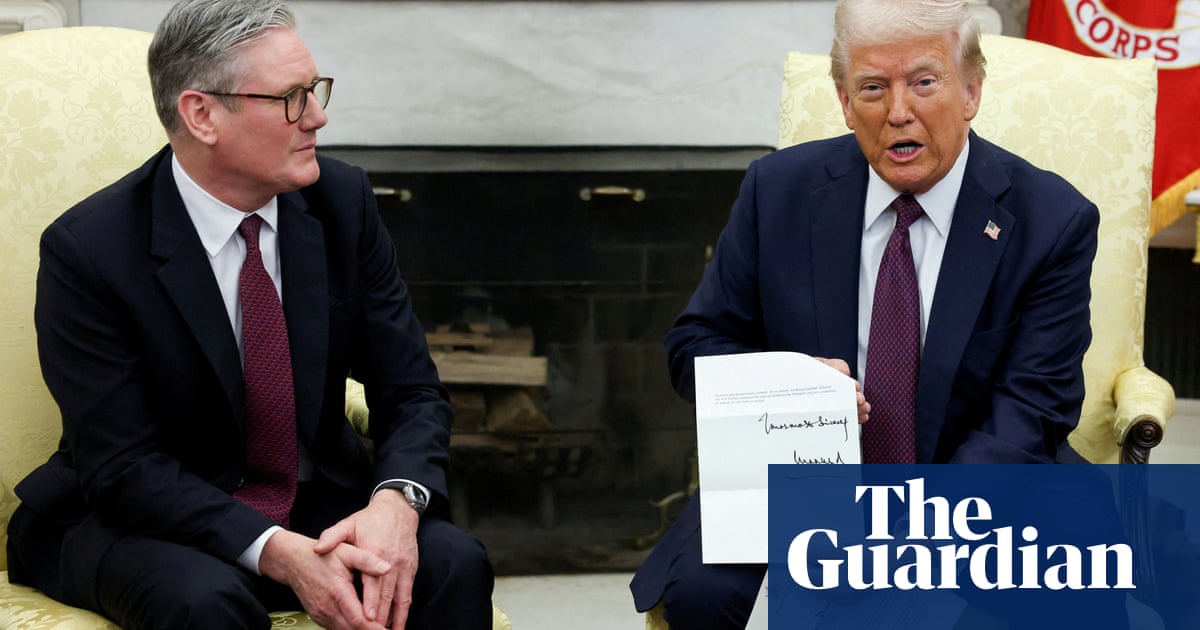The British government’s attempts to curry favor withDonald Trumpby nudging golf executives to host one of the world’s most prestigious golf tournaments at aScottishvenue owned by the US president could ultimately lead to a violation of the US constitution, ethics experts have warned.
The Guardianreported this weekthat officials in British prime ministerKeir Starmer’s government have asked senior executives atR&A, which organizes the Open championship, whether they would host the golf championship at the Turnberry golf resort in 2028.
Trump, sources have told the Guardian, has raised the issue “multiple times” with Starmer. One person with knowledge of the British government’s moves said in connection to the championship that the UK was “doing everything it can to get close to Trump”.
But US ethics experts say any decision by R&A to choose Turnberry as its 2028 venue may break the spirit, if not the letter, of the US constitution’s emoluments clause, which prohibits federal officials from accepting benefits from foreign or state governments without congressional approval.
R&A is not owned by the British government, and Downing Street officials have said the decision will ultimately rest with the golf executives.
But R&A have suggested that choosing Turnberry as the 2028 venue would require public investment because theScotlandlocation poses “logistical and commercial challenges”, including needed road, rail and accommodation infrastructure. R&A has said it is conducting “feasibility work” around the issue.
“This apparent pre-condition of government investment, along with the prime minister’s role in trying to influence decisions of R&A about tournament location, looks like sufficient government involvement to meet the meaning of a foreign emolument under the emoluments clause,” said Richard Painter, a law professor and former chief White House ethics lawyer from 2005-2007.
Painter pointed out that, while Britain has been one of the US’s closest allies for two centuries, it was somewhat ironic that political leaders there were seeking to curry favor with Trump in this way, given that the emoluments clause was likely written by the drafters of the constitution with Great Britain in mind.
“Great Britain was the most powerful empire at the time and the fear was that we would be recolonized by the British or another European power,” Painter said.
Another expert, Jordan Libowitz atethics watchdog Crew, said that while conflict of interest laws do not apply to the president, it was still “highly unethical” to use the presidency to benefit your private business.
“If moving the tournament there would result in British government funds being spent at the course, it would likely violate the constitution’s prohibition on foreign emoluments,” Libowitz said.
The British government’s apparent attempt to help Trump realize his long-held ambition to host the Open at Turnberry comes aspublic documents in the UK showTrump appears to have taken control of the trust that controls Turnberry in April, after having relinquished any role there in 2017 following his first presidential election.
The public registrationdocument, which states that Trump has the right to exercise “significant control over the activities of a trust and the trustees of that trust”, was filed to Companies House on 24 April, six days after aphone call was heldbetween Trump and Starmer. A public readout of that call said the two leaders discussed “ongoing and productive discussions between the UK and US on trade”, the war in Ukraine, Iran and Yemen.
The White House did not respond to a request for comment.
Trump has facedmultipleallegationsin the past for violating the emoluments clause.
Last year, Democratic congressman Jamie Raskin, who at the time was the top Democrat on the House committee on oversight and accountability,sent a letterto Trump demanding the return of $7.8m he accepted from foreign governments during his first term, which Raskin said was “a fraction” of the sum that Trump probably accepted from foreign governments at his various businesses.
The Trump Organization has said Raskin’s claims were false and baseless. In aJanuary 2024 letter, the company also said: “The purpose of the Emoluments Clause has always been to prohibit the acceptance of financial benefits in exchange for the performance of one’s official duties – not to forbid the acceptance of profits emanating from a private, family-owned business.”
Ciara Torres-Spelliscy, a fellow at the Brennan Center for Justice,noted in a 2021 reportthat no court has – in the US’s 200-plus-year history – ever litigated a violation of the emoluments clause.
The US supreme court declined to review one case in which a lower court ruled that the Congress lacked the legal standing to sue a president under the foreign emoluments clause. Two other cases involving Trump were dismissed by the supreme court as moot after he left office.
